I love cooking and I love eating. For this reason, I’m a keen fan of cooking schools/classes and have done quite a few over the past couple of years. Add in that I particularly like to try dishes that are typical to the region I am travelling through and it was a no-brainer to sign up for the NicAsí Cooking Workshop while I was here in León.
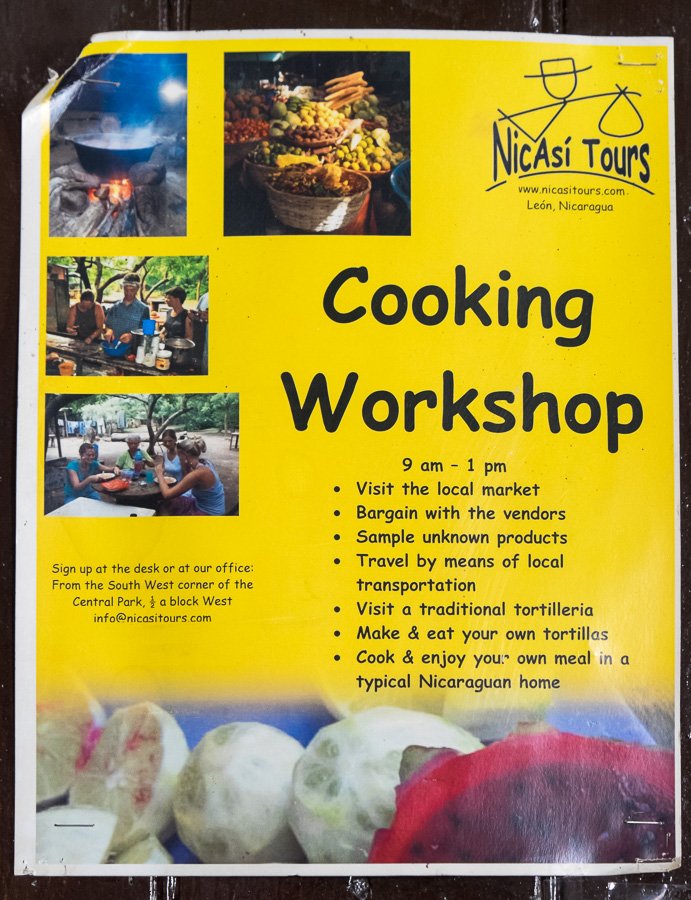
I rocked up at 8:45am to enquire about the workshop and was lucky enough that there was one running from 9am to about 1pm. I joined Katrina (from Ireland), Daniel (from England) and our young Nicaraguan guide, Gerald, and off we headed to the local market behind the Cathedral. After all – you can’t cook without fresh ingredients!
First stop was the cheese shop where Gerald had us try 4 different types of cheese common in Nicaragua. Queso fresco (fresh cheese) was a little like very mild fetta cheese, queso frito (fried cheese) is a little like fried haloumi (as you would expect), cuajada is a very soft cheese but with plenty of flavour, and queso duro (hard cheese) is nothing what you would expect from the name. Smokey and salty, it is a long way from what we would think of as hard cheese in Australia. Queso duro and cuajada (which I’d had before) were my favourites 🙂
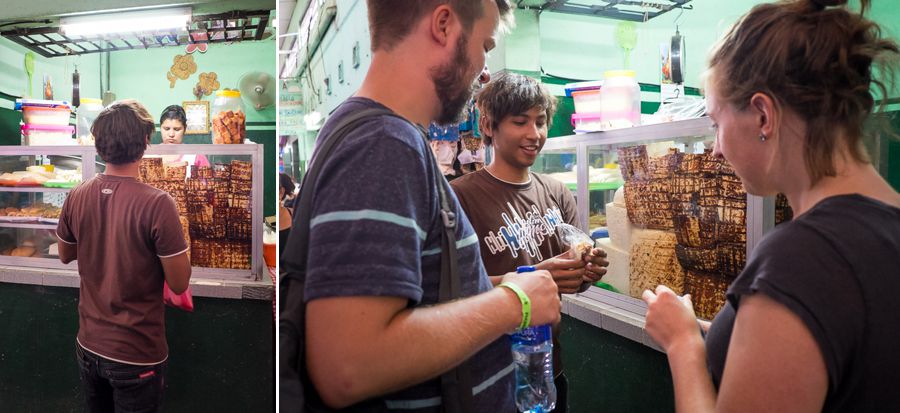
From there it was time to buy the meat for our dish. We had a choice – we could either cook Iguana soup or the more typical Indio Viejo. We went for the latter option.
Gerald had a shopping list which he handed to each of us in turn to buy the ingredients. Although the workshop was primarily in English, he was keen for us to practice our spanish as well with the sellers in the market.
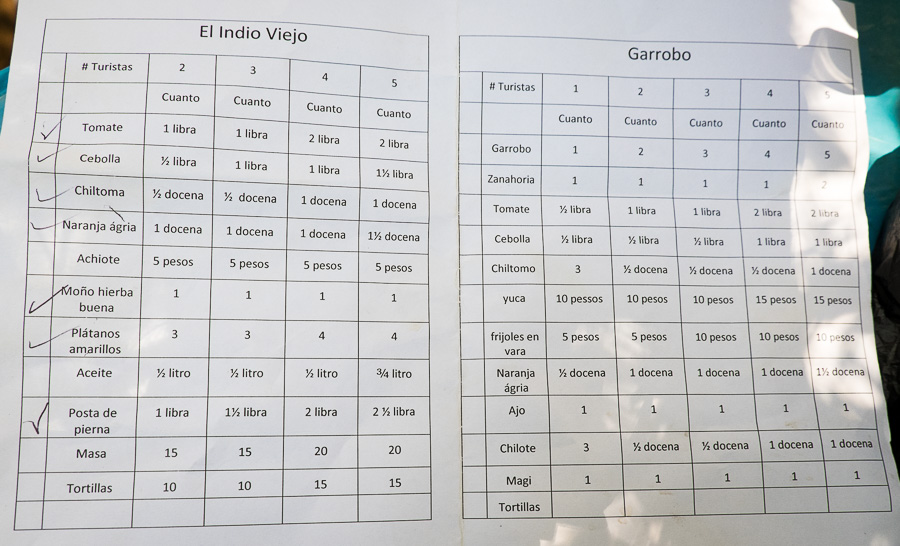
I bought the meat – 1.5 pounds of beef from the leg – from this very industrious lady (bottom image, the top lady is the iguana lady) that gets up at 2:30am each day to slaughter an animal so that it is fresh to sell in the market. She came equipped with a bluetooth earpiece as well!
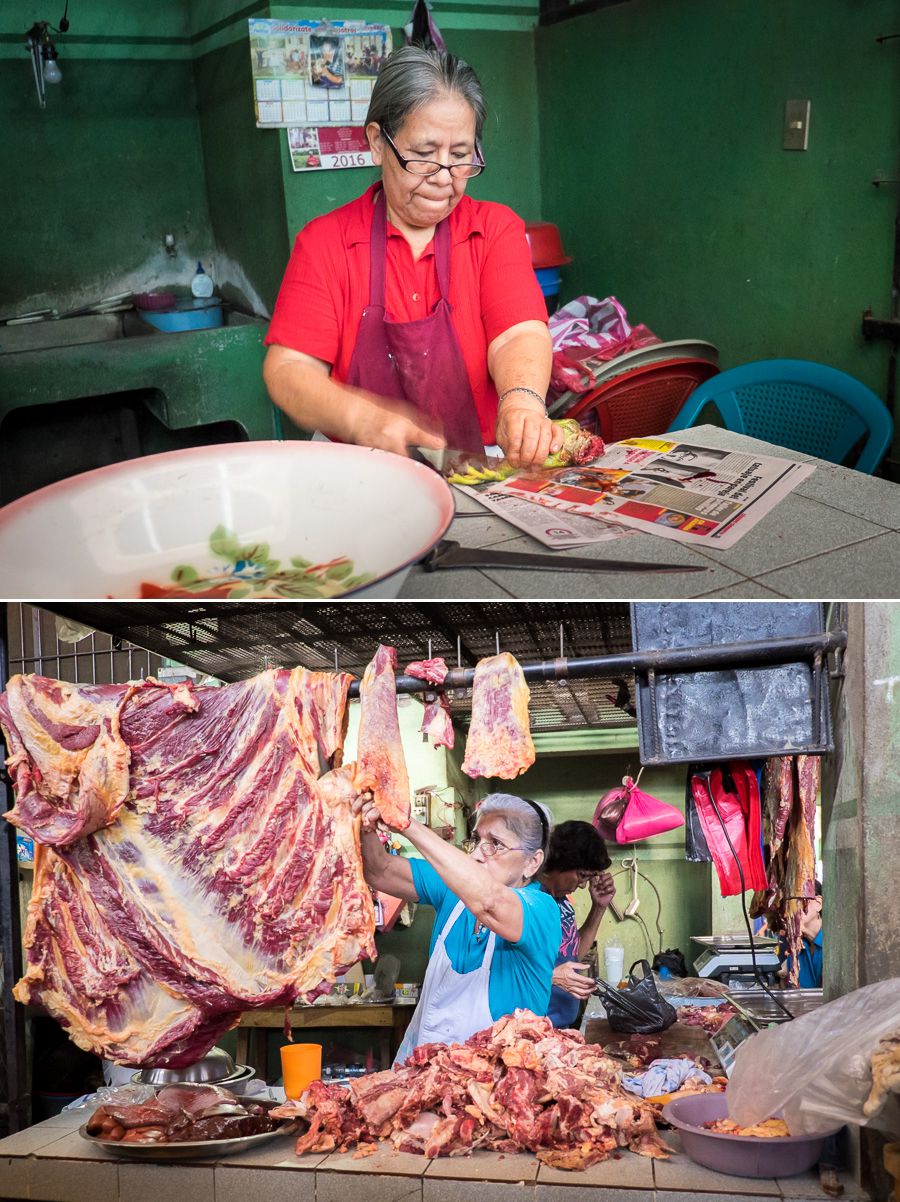
Katrina bought all the vegetables and fruit that we needed for the Indio Viejo (tomatoes, green capsicum, onions, plantains, sour oranges, mint) and Daniel bought the achiote (colouring more than flavouring) and other odds and ends to complete the dish.

From the market, we headed out to the barrio Subtiava on public transport. Managed to get onto a surprisingly uncrowded bus. These are rare in Central America!
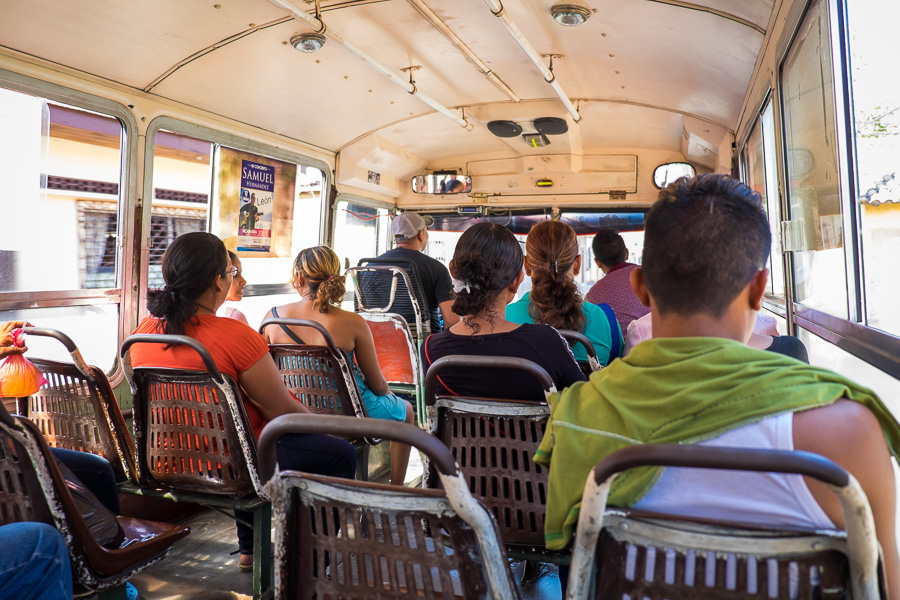
There our first stop was to buy freshly made tortillas. We were lucky enough that when we arrived they were still in the process of milling the corn for the “masa” (dough) so we poked our heads in to see the grinding process. Before it can be ground, the corn is dried and treated with a slaked lime solution, and once it is ground it is ready to make tortillas.
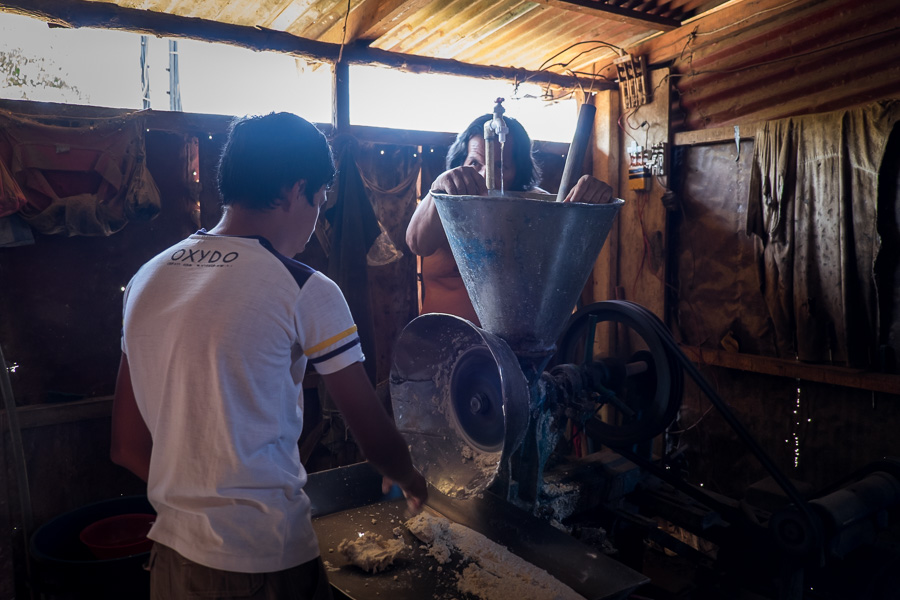
And of course we each had to have a go at making our own tortillas. The ladies gave us a very quick demo and then tried not to laugh as our efforts produced tortillas that weren’t terribly round, even with their tips and tricks to help. These ladies start at around 4am and finish at 1pm – making about 1000 tortillas per day to sell to people who drop by, as well as hospitals and market sellers.
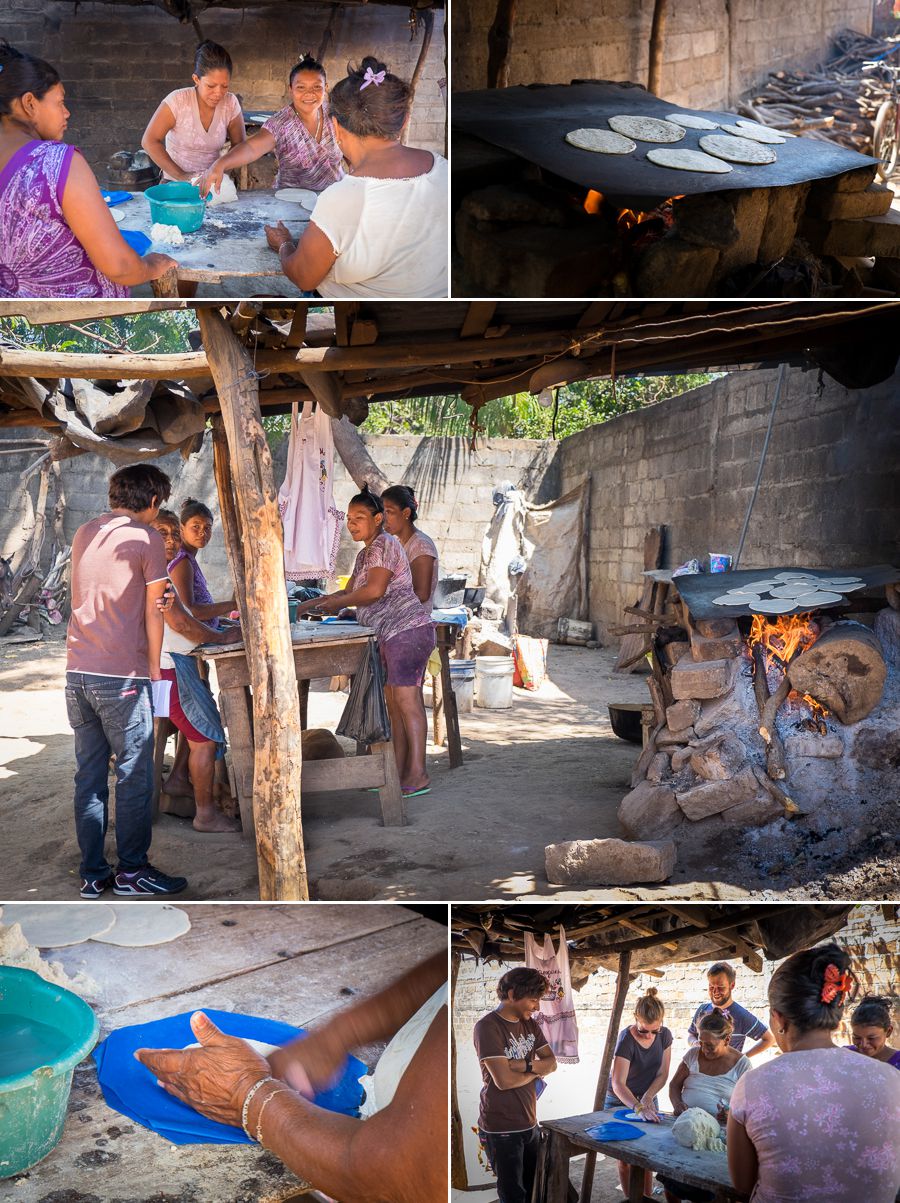
We each made one (that eventually turned out to be more-or-less round) that was then cooked on the open fire, and these formed 3 of the 10 tortillas we bought to go with lunch.
From there it was off to the the house of Aura who (along with one of her 4 dogs, her kitten, her 6 year old daughter and a parrot) set us to work chopping vegies/fruit and mixing more of the masa with the achiote and water.

After about 1/2 hour, Aura took the meat off the fire (it was just boiling away in some water and salt to cook) and we had to pound it to tenderise it and also so that we could pull it apart into smaller pieces (and get rid of the fat) to go into meal. What did we use to pound? A smooth rock of course! I was the best at this step, bashing away with plenty of vigour on a rickety wooden bench (the others were too worries about the bench collapsing to bash hard enough).
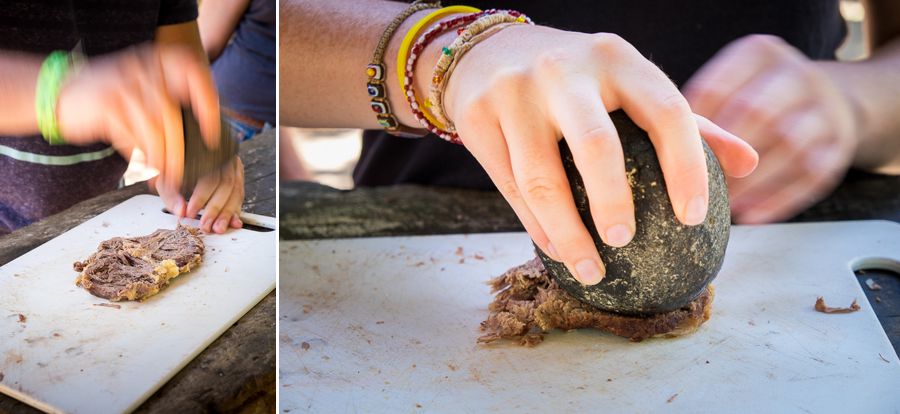
Then everything went into the one pot to cook for another ~20 minutes and we made a salad of tomato, onion and orange juice to accompany.
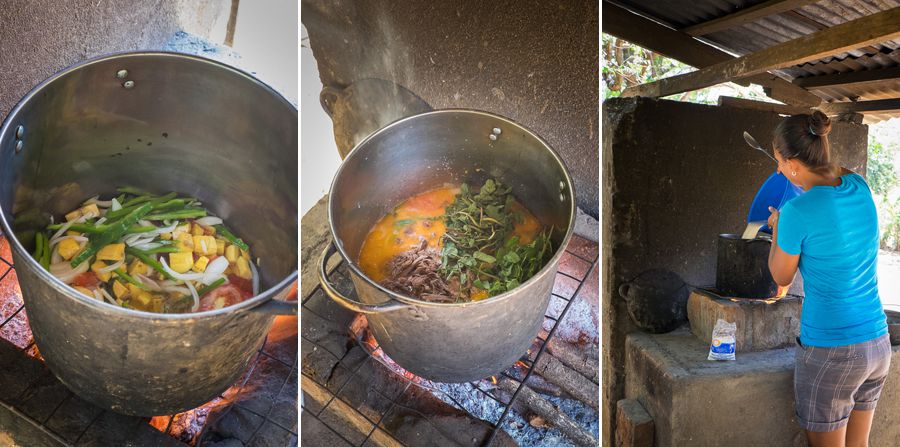
Once it was cooked, we sat down to fresh tortillas, salad, the 4 different types of cheese we bought from the market and the main dish – Indio Viejo. It was really, really good! Very different flavour to everything else I have eaten in Nicaragua – a little sweet but still mostly savoury. Gerald, Aura and her daughter also sat down to eat with us and we chatted about Christmas dinners amongst other things while we ate. Really enjoyable lunch under the shade of a tree in the backyard of a typical Nicaraguan house.

Public transport back to central León was a hell of a lot more crowded – less than standing room only in the back of a covered truck (there were people hanging off the back) – but such is daily life in Nicaragua!
Recommendation: If you are interested in trying a very traditional Nicaraguan dish and keen to see a little more what typical Nicaraguan life is like – the NicAsí cooking workshop is a must!
Booking: The NicAsí cooking workshop runs out of the Vía Vía Hostel in León. You can just call by and ask when the next one is running
Cost: The cost was US$25/person which included the tour, the food and the cost of the public transportation